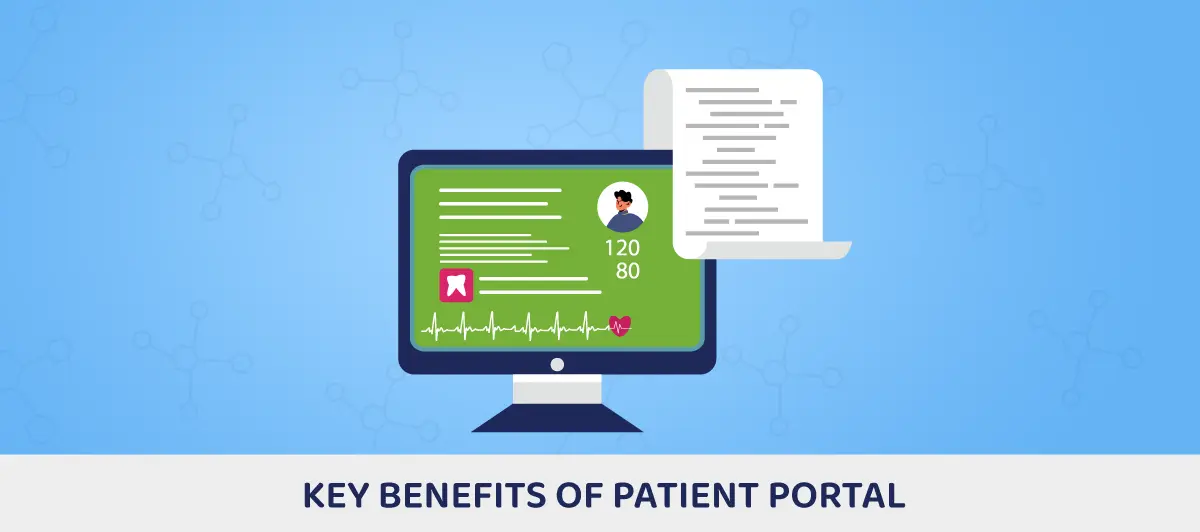Top Benefits Of Patient Portal That Enhance Healthcare Service
Quick Summary: Patient portals are the platform through which patient can interact with doctors without a hurdle. There are numerous benefits of patient portals that increase patient satisfaction and engagement. It allows patient to access their medical records 24/7, allows secure communication with health care providers, and many more. Let’s read this blog and learn about the top benefits of the patient portal.
Introduction
The healthcare today is not just healthcare but digital health benefits. This Digital transformation streamlining various hospital’s services in various aspects. One of those digital transformations is Patient Portals. There are numerous benefits of the patient portal.
Which are continually evolving to provide patients with more convenience, accessibility, clinical outcomes, and personalized care.
But what are patient portals? And what’s their actual benefits?
There are many benefits… and we will discuss some major benefits of using patient portals.
Furthermore, we will also define what a patient portal actually is!
Keep reading and understand this variant of patient management software!
What Is The Patient Portal?
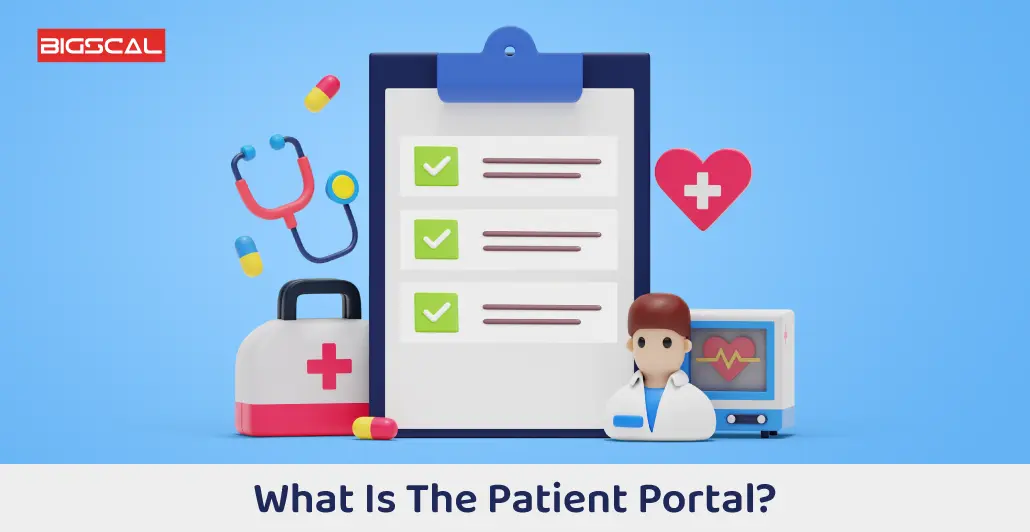
So, A patient portal is a type of patient management software. You can also call it an electronic patient portal. It is a secure online platform that allows personal Health information access, communicate with healthcare providers, schedule appointments, view test results, and more through a secure online website. Additionally, it helps in Healthcare service improvement.
It provides a convenient way for patients to manage their healthcare and interact with their healthcare provider electronically. Many healthcare systems and providers offer patient portals to improved patient engagement and streamline communication.
What Are The Functions And Uses Of Patient Portals In Healthcare?
So, have you understood what a patient portal means? Now, if you have a question regarding what is the best practices and use of patient portal then read these points and understand the best practices and key uses and functions of patient portal system:
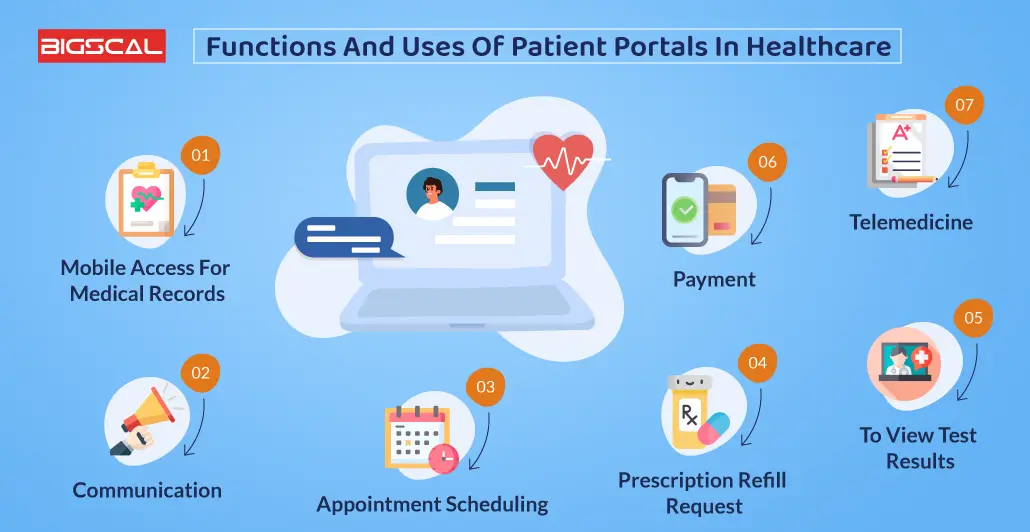
Mobile Access For Medical Records
Patient portals provide a convenient way for individuals to access their online medical records using smartphones or tablets via secure online websites. This means patients can view their electronic health records or personal health information from anywhere. Furthermore, they can check their lab results, prescription history, upcoming appointments, and even persplans.
Additionally, it makes it easier to allow patients to share their records with different health care providers, ensuring they have all the necessary information to give you the best care. Plus, it’s a step toward going paperless and more eco-friendly in healthcare. Overall it helps in enhanced patient care.
Communication
Patient portals are a secure online bridge between patients and their health care providers. They allow patients and you to communicate with your doctors and nurses easily. Patients can interact with their provider in many ways: sending messages, questions, or requesting refills and renewals via patient portal. This is a fundamental healthcare revolution simply because now patients can see a nurse or a doctor outside the office hours and even if there is no phone available.
Additionally, the healthcare team can also contact their patients, delivering appointment reminders, depending on whether follow-up appointment is needed, or if they need to know about personal health information. It’s all in place, one application that you can organize all of them and easily access them too. It works as a support to take your personal life more in consideration and to develop cooperation with your attendant providers, the outcome being the best and efficient care. The patient portal also decrease Reduced administrative burden.
Appointment Scheduling
The patient’s portal offers the comfort of booking medical visits online, which have been highlighted as a factor limiting access to healthcare. Patients will have the opportunities to login, view open slots and pick the most suitable date and time for their appointment at the doctor’s clinic. It saves the trouble of a lengthy telephonic conversation and the patient gets a slot at the time of his/her choice. It is also the place that is easily readable and concisely shows the series of the future appointments for avoiding the accidental conflicts with the scheduling.
Furthermore, it is a frequent assistants for patients by sending useful notices which would help in avoiding forgotten appointments. In fact, overall the medical appointment scheduling through the patient portal simplifies patients to receive effective personalized healthcare close at hand.
Prescription Refill Request
Patient portals having features which make it easy to re-order prescriptions prevent the need to make separate appointments along with simplifying of the process. Due to patient portal software adoption, patients can easily log in and confirm the medicine they are in need to refill, and submit a request to their healthcare provider. Thus, the necessity to call the doctor’s office for dialing back the prescription refill will be avoided as well as the need for visiting in person for the same. By the way I proceed from the fact that I have an exceptional problem it’s being solved easily. You don’t need to call doctor’s office or visit personally for prescription renewals since everything is solved online.
Another advantage of this technology is that it improves safety as doctors can check the patient’s medical historical data and over-prescription can become unnecessary. With patient portals, patients themselves conveniently and efficiently have control of their medications. Combines of these factors helps patients to better adhere to medication plan and overall healthcare quality as a result.
To View Test Results
Patient portals are online tools that allow individuals to access their own personal health records and information conveniently and securely. One of the key uses of patient portals is the ability to view test results. When patients have been tested medically by another technique like getting their blood work or imaging, the healthcare provider, uploads the lab results that appeared back on the portal too.
This function allows a patient to check their health indicators and results of medical test without calling them up to the office or visiting him/her during in a person to person conversation. Therefore, they may be able to notice patterns and historical illness information which are crucial for tracking your overall health improvement, conversations with family, and the healthcare provider during your meetings.
Payment
Online patient portals have two other important features: first, the right to make payments for health care services and, second, the opportunity to communicate with health care providers and organize their own care. It streamlines the billing process by enabling patients to use and pay for their medical bills easily online. The local government will not only cut the time but also will build the trust among the citizens. Patients can simply go onto the portal and study the billing statements, know the costs associated with specific treatments and methods, and settle all bills conveniently through the portal.
Strikingly, majority of online portals allow payment through multiple channels which may include credit cards, electronic fund transfers or even establishing payment plans. Additionally, within the providers set this service, patients are able to save on costs and also avoid the frustrating paper-based billing systems.
Telemedicine
Telehealth integration service is one of the available modalities which connects patients with their doctors from any location through the use of technology such as video calls. It is the patient portal that takes the role of enabling the patients to schedule virtual appointments and Secure messaging system with their doctors as well as the vital ability to share symptoms and vital signs. This encourages healthcare to be more operable both at the point of need and in patient’s housing, especially for those who cannot afford transportation or are unable to move.
Through the telemedicine a patient can be consulted, have a diagnosis, maybe get a prescription but all this without leaving his home. Effective functioning of patient portals enables narrow chances of medical treatment being handled only by health care providers, thus making health care accessible and streamlined.
Key Benefits Of Patient Portal That are Enhancing Healthcare
Before switching on any new approach we need to know all about it, especially what we will get from it. And we come up with the key benefits of patient portals in healthcare which will help you to know what you will get from
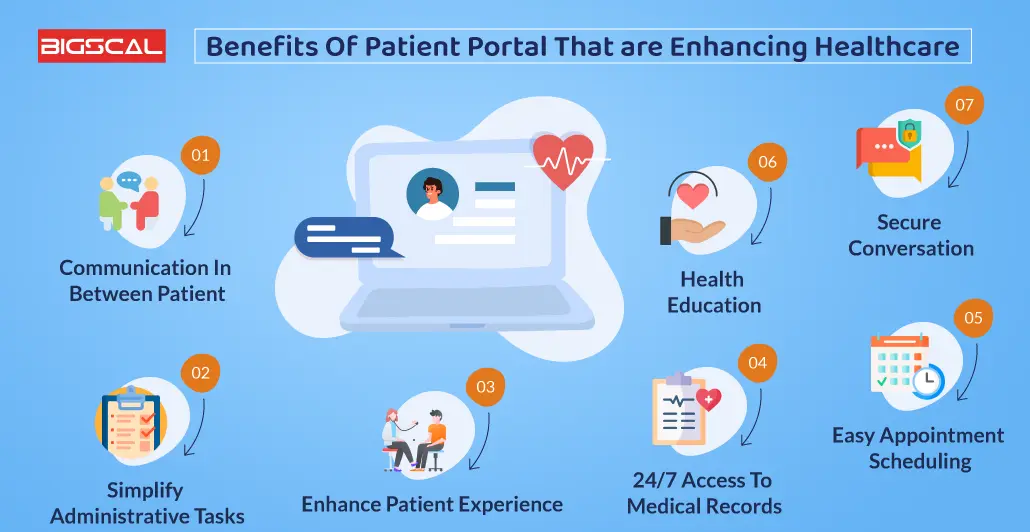
Enhances Communication In Between Patient
The main patient portal benefits for providers is that; A patient portal is like a bridge between patients and their healthcare providers. It’s a place where you can send messages, ask questions, and get answers. Additionally, with it, you do not need to play phone tag or wait for an email reply. With a patient portal, patients can talk to their doctor, nurse, or pharmacist with ease.
As it provides seamless communication between patient care provider and doctor, the communication gap decreases, and health care enhances efficiency.
Simplify Administrative Tasks
Nobody likes dealing with paperwork, right? Well, a patient portal can save you from a lot of administrative headaches.
Think about all the paperwork that comes with healthcare. Filling out forms, dealing with insurance, and keeping track of bills can be a headache. But a patient portal can help to reduce this headache.
Its the main Patient portal advantages that Patients can update their personal information and insurance details and even pay their bills online. No more waiting on hold or rushing to the clinic to sort out these things. It saves you time and lets you focus on what really matters – your health.
In a nutshell, a patient portal makes healthcare smoother and more convenient. It’s all about communication and making the administrative stuff as easy as ordering takeout. So, if your healthcare provider offers one, give it a try. It’s a win-win for both you and your healthcare care team together.
Enhance Patient Experience
Patient portal allows Patients to access their personal medical information from their computer or phone easily. It gives them the power to see their test results and upcoming appointments and even communicate with your healthcare team.
One of the big benefits is convenience. Patients don’t have to spend time on hold or wait for letters in the mail. It’s all there at your fingertips. Need to check your prescription? They need to log in. Want to ask the doctor a question? Send them a message. It’s like having your healthcare in your pocket.
Additionally, patients can track their progress, set reminders for medications, and get educational materials.
So, in simple terms, a patient portal is like a helpful friend who keeps all health info organized, easily accessible, and available whenever needed. It’s a digital tool that truly enhances health care.
24/7 Access To Medical Records
What if patients can check their medical records anytime, day or night? That’s the advantage of a patient portal. It’s like having your health information at your fingertips. It all is possible by the help of remote patient monitoring companies that provide solutions like this.
With 24/7 access to personal health info, you can see your test results, doctor’s notes, and even your medication list whenever you want. This means you don’t have to wait for the clinic to open or call the receptionist to get this information. It’s right there for you when you need it.
This convenience can make a great change. It helps you stay informed about your health without any hassle. Patients can keep track of their personal health information, progress, remind themselves of upcoming appointments, or have peace of mind by knowing their health status. Additionally, if they ever need to share your medical info with another doctor or specialist, they can easily do that through the portal.
So, 24/7 access to personal health records isn’t just about convenience; it’s about empowering patients with information making healthcare more transparent and accessible.
Easy Appointment Scheduling
Doctors set up a patient portal for easy appointments scheduling. With this type of patient case management software no one has to spend much time on the phones, navigating complex automated systems or waiting on hold. With a Portal, patients can log in, check doctor’s availability, and pick a time that suits them. It’s just like booking a restaurant reservation online, but for your own health care organizations.
It reduces the hassle and stress of coordinating with a first office visit in a busy clinic. Additionally, they will receive time-to-time reminders, so that they don’t skip a checkup. It is a time saving and convenient feature that enhances the patient experience. Moreover, it makes health care more accessible and accommodating.
Health Education
Another amazing patient portal benefit is that it can provide patient access to health information and education. These portals are like a treasure trove of health information technology either about particular medical conditions or general wellness. They offer easy to understand articles, videos, and resources about health and awareness.
Patients can get any info about health and with this info they can do future research and become more aware. They can better understand their conditions, treatments, and precautions. Additionally, this health service not only empowers patients to take charge of their health but also establishes a strong patient-doctor relationship. When they visit their doctors, they can ask more questions and engage in care more actively.
In simpler terms, patient portals are like having a trustworthy health library at fingertips.
Secure Conversation
A patient portal is like a digital gatekeeper that keeps your health information safe and sound. It’s like having a secret chat room with your doctor. Patients can talk about their health concerns and share important stuff, like test results, all within the portal, knowing it’s private and secure.
Think of it as a personal vault for medical talks. No one else can eavesdrop, so patients can be open and honest about how they’re feeling. It makes them feel safe, just like whispering a secret to a close friend.
Efficient Healthcare Outcomes
Patient portals play an important role in modern healthcare, and they bring several key benefits that enhance the quality of health care organization give. One major advantage is their ability to improve healthcare outcomes. There is, however, one important advantage in that healthcare results can be improved by their presence. A patient portal offers them a chance to retrieve in one spot, the information that is concerned with them, such as the test results, medication lists, as well as personal health plans.
The ease of this feature just makes the right for a patient to interact more prominently with managing their health. When patients are empowered by information and they are actively participating in making the decisions, they show better adherence to the treatment and they make healthier lifestyle decisions more often.
As an additional advantage, patient portals help the patients to interact with the doctors better. These portals allow the Patients to send texts or questions to any of their doctors, nurses or specialists they are seeing. This open channel of communication helps patients to get quick responses to any concerns they may have, which means there is often a need to modify treatment plans in a timely manner. Finally, it has the long-run efforts for increasing the effectiveness and client-centered healthcare. The author describes the benefits that AI offers to healthcare. In summary, these highly advanced devices result is a reduction in mortality rate.
Enhance Medical Workflow
Patient portals, therefore, extend benefits to the whole healthcare community. Doctors additionally have less to do and receive high quality data from their patients. The portals are an integral part of the medical practice admin side which they streamline. They decreased the administrative workloads and paperwork hence, the healthcare staff can, indeed, focus on the patient care. Offering appointment scheduling through a patient portal reduces the administrative staff workload and makes record access easier for the front desk staff minimizing errors and ensuring they have the most updated information.
Besides, patient portals even boost effective communication among healthcare practitioners. Doctors, nurses and other professionals can via a certain system exchange patient information securely, which makes it possible to minimize errors and ensure that all of the care staff on the list have the same information.
To note, portals for patients also facilitate smooth billing and payment. Patients find it convenient to view their bill online and can make payments faster making the practice service Efficient healthcare delivery.
Prescription Management
Through patient portals, patients can now promptly access their medical records and medication management more efficiently. The patients are able to see their medications online, request refills if they need, and update their own medication list. Its analogous to having a pharmacy under your fingerprints.
When a patient uses a patient portal for prescription management, they can easily access their medication list. This ensures they always know what they’re taking and why. If a patient needs to be more mindful or juggle multiple medications, this can be a lifesaver.
Another great feature is the ability to request prescription refills online—no more waiting in long pharmacy lines or making multiple phone calls. A few clicks and your refill request is sent to the healthcare provider.
Moreover, it enhances safety. Patient portals often provide drug interaction alerts, which can warn patients if a new prescription does not go well with their existing medications.
Remote Monitoring
The most popular benefit of patient portal is it provides remote monitoring via mobile accessibility. This makes health care better. It allows patients and doctors to keep tabs on health conditions from a distance. Patients can consider it like having a virtual nurse by their side. They can input their medical conditions regularly, like blood pressure, weight, glucose level into a portal. And this information will be securely shared with the doctor, then they can monitor trends and detect potential issues early.
The benefit is clear: doctors set up patient portals to reduce the need for frequent physical visits. Which makes healthcare more convenient and cost-effective. Moreover, remote monitoring is especially beneficial for those in rural areas, who may have limited access to healthcare facilities.
It’s a win-win for both patients and doctors, fostering a collaborative and proactive approach to healthcare. Overall, patient portals with remote monitoring are bridging the gap between patients and healthcare providers, making healthcare more accessible, efficient, and more patient centered care more-centered.
In a nutshell, Prescription Management through patient portals simplifies medication routine, making it safer, more convenient, and organized.
Want To Leverage The Advantages Of Patient Portals? See How Bigscal Can Help
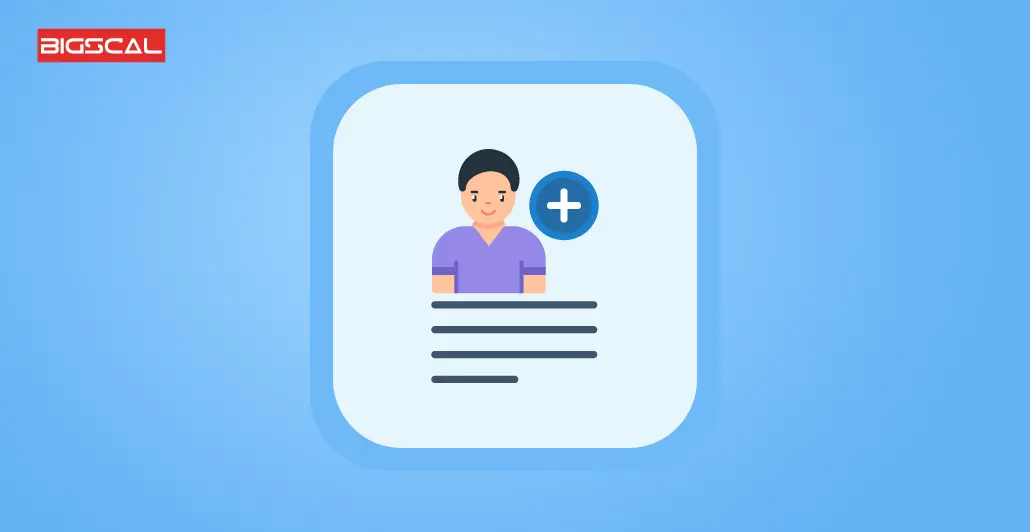
After reading and understanding all these advantages of patient portals, you must be thinking about how to harness benefits or features in using patient portals and how to develop patient portals. We can assist you with this. See how?
With our expertise, you can create a patient portal and secure website that’s user-friendly and secure. The patient portal development not only increases patient satisfaction not only enhances patient engagement but also simplifies administrative tasks, the rest of the advantages you have read already.
Overall, leveraging our expertise to harness patient portal benefits will be a smart move. To know more about how Bigscal Technologies can help you leverage these benefits, visit our website or contact us directly for more information and a consultation.
Conclusion
So, now you understand all about patient portal, patient portal definition, what are their benefits, has a lot of benefits. They are a valuable tool for modern healthcare. It establishes patient-centric care and improves the patient’s overall experience.
Additionally, you also know how you can take our help to own patient portals. So, read these benefits again and again until you don’t understand, and then take a step towards developing a patient portal.
FAQ
What is the purpose of patient portals?
The role of patient portals is to give patients secure access to medical data online so that the information they have can include records, test results and appointments. They allow patients to become actively engaged in the management of their health, to communicate with the providers and to use the resources, thereby the patient depending on becoming engaged and coordinated in the care management.
What are the two types of patient portals?
There are two main types of patient portals: digital nomads are not anymore confined to any physical space or time limit; they can easily carry their office in their pocket. Tethered portals are already tied to a particular healthcare provider’s electronic health record (EHR) system by design therefore, patients’ data can be retrieved only from this integrated EHR system. While health records managed by their independent organizations are accessible through separate portals, a more integrated view of patients’ medical history is achieved through a health aggregator that pools data from various sources.
What is the difference between EHR and patient portal?
The definition of an Electronic Health Record (EHR) says that it is a digital version of one’s complete medical history and treatment information. The main purpose of EHR system is to serve as a clinical tool for healthcare providers. On the negative side, patient portals are the patient-specific, secure online platforms that let patients to see some of the EHR data, schedule appointments, communicate with their providers and to a certain degree, manage their health. The EHR is the broad stipulation for a healthcare database or medical records, while the patient portal is how patients can access a little part of that data.
Do doctors like patient portals?
Position of doctors on patient portals could differ. Whilst for others it is an advantage because of the higher quality of communication or the increased patient’s engagement, for others it may be to hard due to the big message heap or private information security problems. The degree of satisfaction is usually determined by the quality of use as well as interoperability with the employee’s workflow system and patients’ response to it.
What are 3 benefits of a patient portal?
- Enhanced Patient Engagement
- Improved Care Coordination
- Streamlined Administrative Tasks
